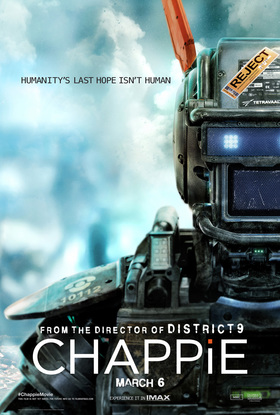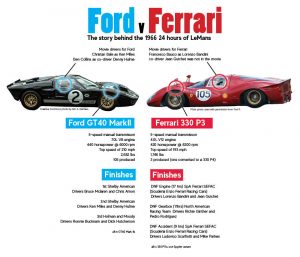Chappie: An artificially intelligent story

March 12, 2015
My relationship with director Neill Blomkamp’s, director of “Elysium” and “District 9,” feature films is that of a love/hate tug of war. On one hand he’s able to make some fantastic looking films both in effects and aesthetics with interesting locations and premises to boot. However, look past the dazzling computer work and often what’s left is a shallow plot that means well but ends off ripping Blomkamp’s own work, time and time again. “Chappie,” Blomkamp’s new film, takes cues from both of these sides to make a film that looks the part but struggles to find it’s own identity.
Set in the near future, inventor Deion Wilson (Dev Patel) has created a new breed of artificial intelligent police robots who patrol the streets of Johannesburg taking down the city’s rampant crime dilemma. Under the close eye of a private military organization, the bots replace much of the human police force. When bot 22 is injured infiltrating a crime ring, Deion sees the perfect opportunity to install a new OS into the robots mind, a program that would hopefully give him the ability to think and feel for himself. That is until the pair is kidnapped by crime duo Ninja and Yolandi who want to use the bot as a means to eliminate an unpayable debt. It’s here that the robot is given the name Chappie and must grow from a child to an adult, learning who he is and what his position as the the first living robot means for the world.
At first glance, “Chappie” seems awfully close to Blomkamp’s previous work, down to the opening shot which mimics “District 9’s” documentary style of filming to a tee. Even the setting of ruined and bleak looking Johannesburg is reused from previous efforts, and that’s the primary problem with “Chappie.” There’s a lot going on but none of it is very original. Throughout the film, major ideas of what it means to be alive and the value of a life are brought to attention, but these ideas never seem to be built upon instead they are rather merely introduced. Blomkamp is very clearly trying to say something about not only robots in the 21st century but deeper more psychological themes. The problem is that none of them are very subtle or new.
This is part to a tone that seems to be all over the place for much of the film. Hugh Jackmans character of Vincent Moore, a fellow inventor of the MOOSE robot program which places a human in control rather than an AI program, is supposed to be a distraught dreamer whose funding for the MOOSE is brought to halt due to the success of the AI bots. Vincent despises the thought of having a computer in charge of life threatening decisions which brings up very legitimate questions about the role of robotics in our everyday lives. He’s supposed to be a sympathetic villain who’s passionate drive pushes him over the edge, but his performance comes off closer to something you’d see in a Looney Toons episode. While Jackman no doubt gives the performance all he’s got, his sheer craziness and pointless motives near the third act harshly collide with Dev Patel’s more grounded role as Deion. His character ends up being distracting more than anything and illustrates why a villain of this caliber wasn’t needed for “Chappie” to succeed.
Then theres the duo of Ninja and Yolandi, members of the South American rap duo Die Antwoord, who are charged with practically playing themselves in the roles of Chappie’s “adoptive parents.” A quick google search will show you instantly how odd the group can be and their quirkiness bleeds onto the screen in every single shot they are featured. However, it’s hard for me to say that it was a bad thing. There’s something surprisingly addicting about seeing their unique style of not only clothing but body language when interacting with Chappie and Deion. Ninja is able to feel imposing but also act like a moron from time to time, while Yolandi feels like she has a heart of gold despite being a narcotics dealer. It may appear cheesy at first but the two give Chappie an attitude that it desperately needs to differentiate it from the likes of “RoboCop.” For being first time actors/actresses they give decent performances and are a highlight of the film.
Hands down the reason to see “Chappie” is to see the phenomenal work of Sharlto Copley as the robot with a heart and the equally impressive effects done by Weta Studios. Chappie is able to seamlessly blend into live action thanks to stellar motion capture work from Copley, who has been featured in everyone of Blomkamp’s previous films. Chappie’s mind begins as toddlers and by the end of the film has evolved into an intelligent adult. Each of these transitional phases are each executed wonderfully and I began to feel more emotionally attached to Chappie than any of the other human actors, not sure if that’s good or bad. When Chappie is taken advantage of or lied to it’s legitimately heartbreaking to see him struggle, and it’s equally as touching to see the family dynamic between his creator and murderous gangsters develop in a way that feels natural instead of forced for the sake of the plot. Granted, Chappie’s role in changing the world is never really touched upon as the film once again ends very similarly to “District 9.”
“Chappie” isn’t the Citizen Kane of sci-fi that Blomkamp was no doubt aiming for, nor is it funny enough to match early claims of the film being a comedy, but don’t let that stop you from seeing it in the theaters. What’s here is a blast and some gorgeous slo-mo shots and very impressive shoot outs that make for a good time. Disappointingly, it is just sad to see such a fantastic concept and some generally good actors time go to waste simply because of a few bad choices regarding themes and a villain. Though you may not walk out of “Chappie” a changed person pondering the pros and cons of cyborgs taking out your groceries in 10 years, it’s hard to deny the sheer fun and style “Chappie” has to offer in a genre overrun by transformers and explosions.






Sonic boom • Mar 26, 2015 at 2:03 pm
Can you review sonic boom?
Revolver Ocelot (Revolver Ocelot) • Mar 25, 2015 at 12:40 pm
Review Reservoir Dogs already